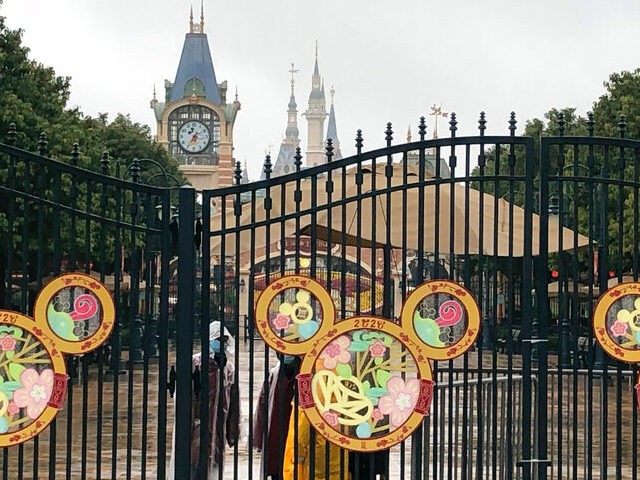Chinese state media on Monday insisted China’s coronavirus control measures are highly “effective” even as record numbers of infections were reported in cities like Shanghai, which shut down its Disney resort until further notice.
Shanghai was among the last major Chinese cities the communist regime admitted to being affected by the current coronavirus wave. Case numbers began climbing steadily on Thursday, prompting city officials to shut down schools, implement mass testing, and on Monday shutter the Shanghai Disney Resort.
The Shanghai resort was the first Disney park in China to close down when the Wuhan coronavirus outbreak began in 2020. It reopened in May 2020 but then shut down again after a customer tested positive in October 2021 – trapping over 30,000 people inside the park.
“I never thought that the longest queue in Disneyland would be for a nucleic acid test,” one visitor quipped as the captive park population waited hours for testing to be completed.
On Monday, Shanghai Disney Resort management said the facility would remain closed until city authorities said it was safe to resume operations.
China reported 1,947 locally transmitted coronavirus infections and 2,384 asymptomatic cases on Monday, bringing the total to over 37,000 infections this month. China’s coronavirus figures should always be viewed with skepticism, but it had reported only 100,000 cases in the entire pandemic until the current wave began.
Shanghai reported screening over 30 million samples with nucleic acid testing over the weekend. Many city employers are now requiring negative test results before employees can return to work.
Chinese coronavirus response leader Liang Wannian defended China’s “dynamic zero-Covid” policies – a euphemism for abrupt lockdowns with little regard for disrupting civilian life – on Monday, even as he admitted zero cases might be an unrealistic target “for the moment.”
“The dynamic zero-Covid approach means we need to swiftly identify the outbreaks and cut the transmission chain to go towards the direction of zero Covid, or the transmission will be continuous and connected, causing a large-scale rebounding of cases,” Liang said in a state media interview.
“China has seen many sporadic cases, or even clusters, but the rising momentum is not exponential, which is exactly because we have taken a series of strong interventional measures to curb the momentum,” he insisted.
Other Chinese officials said the infections have been mostly mild, in keeping with the omicron variant reported in other nations around the world, but the northern province of Jilin reported two fatalities over the weekend. Liang cautioned Chinese health officials not to dismiss the threat of Omicron because its symptoms tend to be relatively mild.
“For some individuals the chance of becoming severe or worse drops after being infected by the Omicron variant, but as a whole it spreads quickly and the absolute number of people being infected in a short period of time will be higher,” he said.
Liang chastised local officials for assuming the pandemic was over and relaxing control measures.
“We are racing against the virus and must act swiftly and stamp it out when it is still in buds,” he said.
China’s state-run Global Times on Monday predicted the omicron outbreak would soon be brought under control while admitting the current situation is “grim and complex.”
“Observers also expressed belief in China’s economy amid expressions of doubt. They said the control measures will have just a short-term impact but will not shake China’s economic fundamentals in the long run, in contrast to some Western media claims that the epidemic control policy will push cash-strapped local governments to the brink,” the Global Times sniffed.
The Chinese Communist paper amended those confident boasts by quoting an unnamed Chinese Center for Disease Control and Prevention official who said the kind of harsh citywide lockdowns that accompanied previous “imported” coronavirus outbreaks were no longer practical.
This reads like a tacit acknowledgment that the Chinese public fears being subjected to a brutal lockdown like the one imposed on the huge city of Xi’an in December. Millions of Chinese are now under stay-at-home orders – about 4.5 million in the city of Jilin, one of the worst-hit by the Omicron wave, and 9 million in the industrial hub of Changchun – but their conditions are not as severe as those imposed on Xi’an.

COMMENTS
Please let us know if you're having issues with commenting.